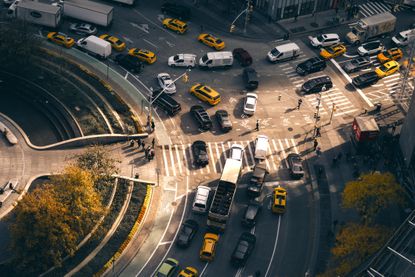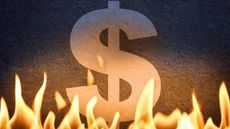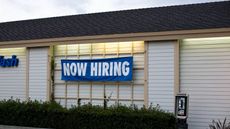NYC Congestion Pricing Makes Traveling By Car More Expensive
The congestion pricing fee schedule has been released and is tentatively set to begin on June 15.


Being a driver or passenger in Manhattan will be getting more expensive. The Metropolitan Transit Authority (MTA) overwhelmingly approved the proposed congestion pricing plan by a 12-1 vote. The MTA is still facing a number of lawsuits that oppose the plan, but the agency is undeterred and will continue working toward implementation. Most of the 110 gantries needed to detect motorists entering the zone and assess tolls have been erected.
Details of how much the first congestion pricing plan in the U.S. will cost have been released. The toll will apply to most motorized vehicles that drive in the Manhattan Central Business District during designated hours. Passengers of taxi and ride share services will have an additional fee added to the fare.
There are schedules for both peak and off peak pricing. Vehicles that pay any way other than using the E-ZPass electronic toll system will pay significantly more. For instance, the peak price for passenger vehicles is $15.00 with E-ZPass and $22.50 without. The tolls for non E-ZPass users are on average 33.4% more.

Sign up for Kiplinger’s Free E-Newsletters
Profit and prosper with the best of expert advice on investing, taxes, retirement, personal finance and more - straight to your e-mail.
Profit and prosper with the best of expert advice - straight to your e-mail.
Officials have not made an announcement about the timeline just yet. A tentative start date of June 15 was referenced during a hearing of one of the pending lawsuits trying to derail the congestion pricing plan according to Bloomberg news.
Where is the toll zone?
The Central Business District (CBD) Tolling Program is the official name of the congestion pricing program that will take effect sometime this year in parts of Manhattan.
Drivers will be charged a toll to enter the Manhattan Central Business District that begins in Manhattan south of and including 60th Street all the way down to the southern tip of the Financial District. The plan excludes the FDR Drive, the West Side Highway and the Hugh L. Carey Tunnel connection to West St. Vehicles will be charged the full toll if they deviate from these highways or connections.
How do you pay the toll?
Drivers will be able to use their E-ZPass tags as they already do to pay tolls on other roads, bridges and tunnels. For those who do not have E-ZPass, a bill will be sent by mail to the registered owner of the vehicle.
Consider getting an E-ZPass transponder and drive to Manhattan if you don't have one. The tolls are 66.6% higher when you pay any way other than E-ZPass.
How much will drivers be charged?
Below is the schedule of toll fees that will be charged based on the type of vehicle being used in the congestion zone.
| Vehicle Type | Peak Congestion Fees in effect 5 a.m. until 9 p.m. weekdays and 9 a.m. until 9 p.m. weekends | Off Peak Pricing |
| Passenger drivers | $15.00 | $3.75 |
| Motorcycles | $7.50 | $1.75 |
| Passengers of taxis green taxis, and black cars | $1.25 per ride | N/A |
| Uber, Lyft, other ride-shares passengers | $2.50 per ride | N/A |
| Small trucks | $24.00 | $6.00 |
| Large trucks | $36.00 | $9.00 |
| Vehicle Type | Peak Congestion Fees in effect 5 a.m. until 9 p.m. weekdays and 9 a.m. until 9 p.m. weekends | Off Peak Pricing |
| Passenger drivers | $22.50 | $5.50 |
| Motorcycles | $11.25 | $2.75 |
| Passengers of taxis green taxis, and black cars | $1.25 per ride | N/A |
| Uber, Lyft, other ride-shares passengers | $2.50 | N/A |
| Small trucks | $36.00 | $9.00 |
| Large trucks | $54.00 | $13.50 |
Are there any exemptions to the toll?
New York City operates over 30,000 vehicles, the largest municipal fleet in the country, according to the mayor's office. In addition to the previous exemption of qualified emergency and specialized government vehicles, the MTA has added an exemption for virtually every city-owned official car.
Qualifying authorized emergency vehicles, such as ambulance and fire trucks, will be exempt from the congestion tax. Specialized government vehicles not intended for general transportation, including street sweepers, sanitation trucks, and roadway repair equipment, will also be exempt from the congestion tax.
- Exemptions for the disabled: There are exemptions for qualifying vehicles transporting people with disabilities and disabled individuals can apply for an exemption for their car or one they designate.
- Exemptions for busses: Transit buses, commuter buses and school buses will also qualify but sightseeing buses will pay the toll. School busses serving public, charter and parochial schools all qualify for the exemption. The Hampton Jitney, Greyhound, Mega Bus and FlixBus will not be hit by the toll. Information about how to qualify or apply for exemptions has yet to be released.
- Busses NOT exempt: Charter, NY Waterway buses and NYU employee shuttles will not get an exemption.
- Tunnel crossing credits: Vehicles using E-ZPass and entering in the daytime via one of the four tolled entries in the CBD (Lincoln Tunnel, Holland Tunnels, Queens-Midtown Tunnel, and Hugh L. Carey Tunnel) will be eligible for a credit. The schedule of proposed credits can be found at the MTA's website at mta.info. There is no tunnel credit during off peak hours
- Low-income drivers: Drivers that receive SNAP, WIC, or TANF benefits or whose household federal adjusted gross income is no more than $50,000 may be eligible for a 50% discount from the peak period passenger vehicle toll rate on their eleventh trip and all trips thereafter in a calendar month
Related Content

Donna joined Kiplinger as a personal finance writer in 2023. She spent more than a decade as the contributing editor of J.K.Lasser's Your Income Tax Guide and edited state specific legal treatises at ALM Media. She has shared her expertise as a guest on Bloomberg, CNN, Fox, NPR, CNBC and many other media outlets around the nation.
-
 Strategies to Optimize Your Social Security Benefits
Strategies to Optimize Your Social Security BenefitsTo maximize what you can collect, it’s crucial to know when you can file, how delaying filing affects your checks and the income limit if you’re still working.
By Jason “JB” Beckett Published
-
 Don’t Forget to Update Beneficiaries After a Gray Divorce
Don’t Forget to Update Beneficiaries After a Gray DivorceSome states automatically revoke a former spouse as a beneficiary on some accounts. Waivers can be used, too. Best not to leave it up to your state, though.
By Andrew Hatherley, CDFA®, CRPC® Published
-
 Starbucks BOGO and New Sweet and Spicy Drinks
Starbucks BOGO and New Sweet and Spicy DrinksFor a limited time, Starbucks is announcing four new "swicy" drinks that are both spicy and sweet.
By Kathryn Pomroy Published
-
 Walmart Lawsuit: Get Up to $500 as Part of a $45 Million Settlement
Walmart Lawsuit: Get Up to $500 as Part of a $45 Million SettlementYou could be eligible to receive up to $500 as a result of Walmart's class-action lawsuit settlement.
By Erin Bendig Published
-
 Credit Card Bonuses up to $1,600 for New Cardholders
Credit Card Bonuses up to $1,600 for New CardholdersEarn up to $1,600 when you sign up for a new credit card. Here are the best welcome offers for new cardholders.
By Ellen Kennedy Published
-
 March CPI Report Comes in Hot: What the Experts Are Saying About Inflation
March CPI Report Comes in Hot: What the Experts Are Saying About InflationCPI A blowout inflation report pushes back the timing of Fed rate cuts.
By Dan Burrows Published
-
 How To Invest Your Tax Return
How To Invest Your Tax ReturnWhen thinking about how to invest your tax return, prioritize your financial health over aggressive – and risky – ideas like bitcoin.
By Jeff Reeves Published
-
 Solar Eclipse Snacks: 25 Best Deals for Enjoying the Big Day
Solar Eclipse Snacks: 25 Best Deals for Enjoying the Big DayWatch the solar eclipse while feasting on these great deals from Burger King, MoonPie, Applebee's, Krispy Kreme and more.
By Kathryn Pomroy Last updated
-
 Solar Eclipse Glasses: Where to Buy, Where to Get Them Free
Solar Eclipse Glasses: Where to Buy, Where to Get Them FreeFind safe solar eclipse glasses at Warby Parker, Target, Amazon and more than 13,000 libraries nationwide
By Kathryn Pomroy Last updated
-
 March Jobs Growth Blows Past Estimates: What the Experts Are Saying
March Jobs Growth Blows Past Estimates: What the Experts Are SayingJobs Report A whopper of a jobs report could complicate the Fed's rate-cut plans.
By Dan Burrows Published